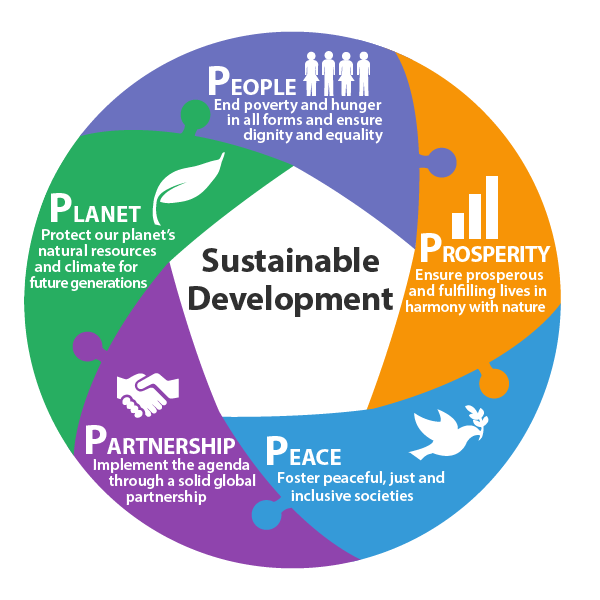What is Sustainable Development?
 Sustainable development (SD) is a process for meeting human development goals while maintaining the ability of natural systems to continue to provide the natural resources and ecosystem services upon which the economy and society depend. While the modern concept of sustainable development is derived most strongly from the 1987 Brundtland Report, it is rooted in earlier ideas about sustainable forest management and twentieth-century environmental concerns.
Sustainable development (SD) is a process for meeting human development goals while maintaining the ability of natural systems to continue to provide the natural resources and ecosystem services upon which the economy and society depend. While the modern concept of sustainable development is derived most strongly from the 1987 Brundtland Report, it is rooted in earlier ideas about sustainable forest management and twentieth-century environmental concerns.
Sustainable development is the organizing principle for sustaining the finite resources necessary to provide for the needs of future generations of life on the planet. It is a process that envisions a desirable future state for human societies in which living conditions and resource use continue to meet human needs without undermining the “integrity, stability and beauty” of natural biotic systems.
How We Do Sustainable Development?
Secure Voice, Video and Data Interoperability
Both internal and external to our Software and Hardware as a Solution, which is Cloud Enabled designed and managed by David Daxenbichler the inventor of the original OASIS interoperability engine used by 35,000 municipalities globally and distributed by Johnson Controls, PELCO, Tyco, Booz Allen and another large-scale integrator on various co-branded and private label names.
Industry Leading Compression
Our compression enables as low as 20 kilobytes per second streaming of video, voice and data
Low-Cost Data Storage
We will select between AWS, Google, Microsoft and Dell (EMC) for long-term data storage to be offered to clients customized to their needs.
Communications (WIFI, TVWS, Cellular & Fiber)
Connectivity in those areas that have no coverage (telephone or internet) or limited coverage due to low bandwidth.
Advanced Knowledge Process Outsourcing (KPO)
With Value-Driven Professional Consulting Services by our team of subject matter experts. Our total solution uses systems analysis techniques to efficiently and cost-effectively customize solutions that transform a business from its current state into a highly effective secure, integrated platform providing both actionable information and dashboard control of the business with the most cost-effective utility costs.
Performance-Based Group Purchasing & Consulting
Executive Talent On-Demand
 We assist our Small Business, Municipal and Emerging Market clients with vendor selection, pricing negotiations and overall project management to augment the capabilities required for a successful deployment.
We assist our Small Business, Municipal and Emerging Market clients with vendor selection, pricing negotiations and overall project management to augment the capabilities required for a successful deployment.
Traditional GPOs in the United States, a group purchasing organization (GPO) is an entity that is created to leverage the purchasing power of a group of businesses to obtain discounts from vendors based on the collective buying power of the GPO members. Many GPOs are funded by administrative fees that are paid by the vendors that GPOs oversee. Some GPOs are funded by fees paid by the buying members. Some GPOs are funded by a combination of both of these methods. These fees can be set as a percentage of the purchase or set as an annual flat rate. Some GPOs set mandatory participation levels for their members, while others are completely voluntary. Members participate based on their purchasing needs and their level of confidence in what should be competitive pricing negotiated by their GPOs.
Group purchasing is used in many industries to purchase raw materials and supplies, but it is common practice in the grocery industry, health care, electronics, industrial manufacturing and agricultural industries. In recent years, group purchasing has begun to take root in the nonprofit community. Group purchasing amongst nonprofits is still relatively new but is quickly becoming commonplace as nonprofits aim to find ways to reduce overhead expenses. In the healthcare field, GPOs have most commonly been accessed by acute-care organizations, but non-profit Community Clinics and Health Centers throughout the U.S. have also been engaging in group purchasing.
Clients Get More Results-Based Service
 Group Purchasing Organizations have established themselves as an important resource in the purchasing sector. The leverage and purchasing power they offer small companies can be a tremendous asset. But it is important to consider all the pros and cons involved when selecting a GPO. You may be forfeiting as many benefits as you are receiving when restricting your purchasing flexibility to the many program restraints of a Group Purchasing Organization.
Group Purchasing Organizations have established themselves as an important resource in the purchasing sector. The leverage and purchasing power they offer small companies can be a tremendous asset. But it is important to consider all the pros and cons involved when selecting a GPO. You may be forfeiting as many benefits as you are receiving when restricting your purchasing flexibility to the many program restraints of a Group Purchasing Organization.
